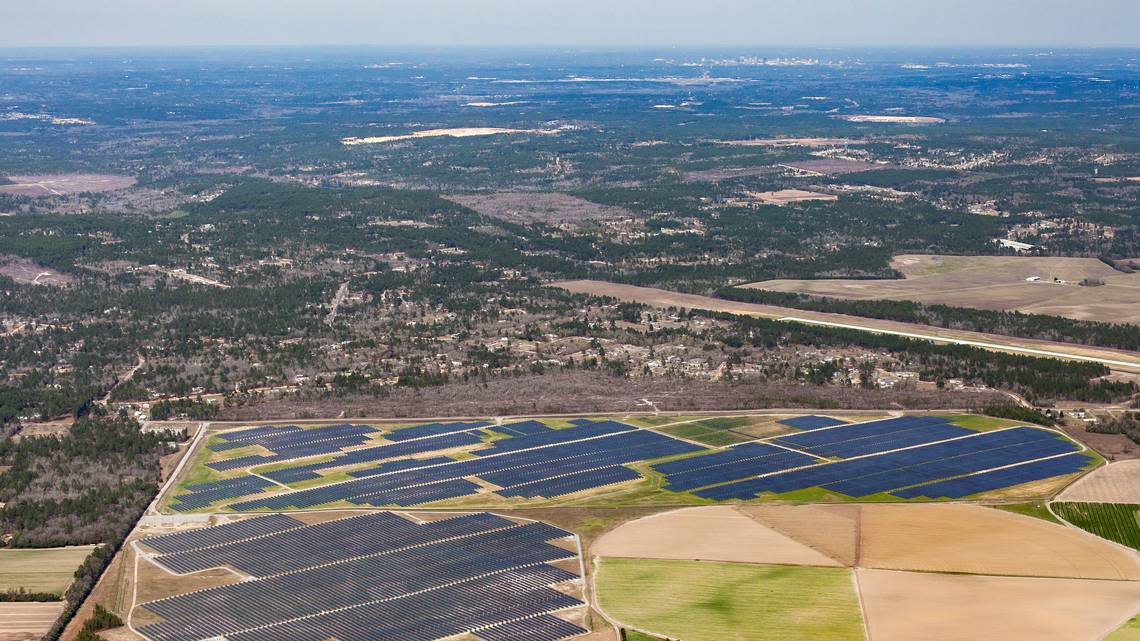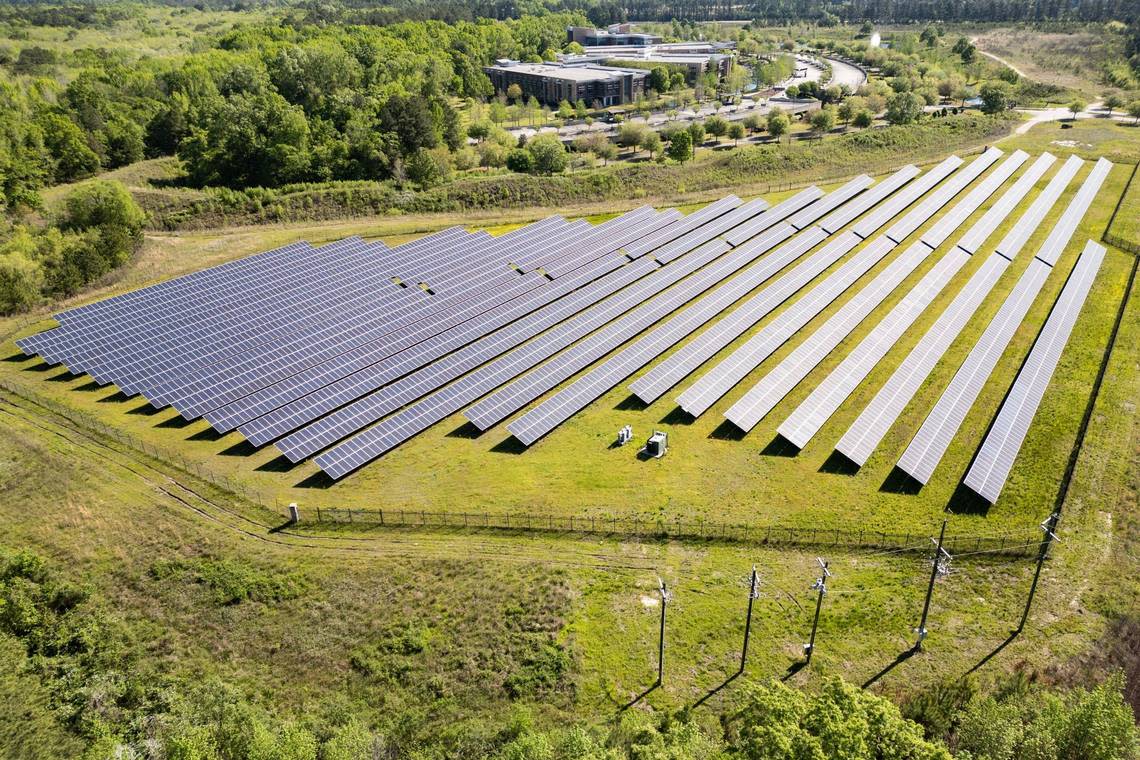SC energy bill restricts solar power. Will consumers end up paying more?
Buried in the middle of a proposal to open a new natural gas plant in South Carolina are provisions that detractors say could chill the expansion of solar energy across the state.
That’s the assessment of environmentalists and solar developers who say legislation before the General Assembly unfairly targets sun power, which in the past decade has made substantial strides as an alternative source of energy in South Carolina.
A House approved bill, which encompasses more than 70 pages, would increase regulation of small solar farms in a state where lawmakers almost never favor more regulation of business and industry.
And the bill would shorten the length of certain contracts between utilities and companies that develop solar farms — a limit that the farms’ developers say would make it hard to put solar energy agreements together.
“This takes us backwards and it would severely harm the solar industry,’’ said Eddy Moore, who is tracking the legislation for the Southern Alliance for Clean Energy, a non-profit organization headquartered in Atlanta. “It would be a significant impediment to progress.’’
Utilities dispute that, but Tom Ervin, a former Public Service Commission member who resigned so he could speak out on the energy bill, said the intent is clear to him.
“It is an attempt to limit solar in South Carolina as an alternative energy source,’’ Ervin said.
So what does that mean for the average person?
In addition to the lack of pollution from solar farms, sun power is viewed as a way to keep utility rates more stable than just relying on traditional power sources.
Those energy sources are dependent on coal, nuclear and natural gas, but solar boosters argue that coal and natural gas are vulnerable to price changes that could affect monthly power bills for the average person.
If the price of natural gas shoots up, for instance, utilities would raise rates, critics of the legislation say. But unlike coal and natural gas, solar power has no fuel costs because energy is generated from the sun’s rays, solar supporters say
South Carolina’s major utilities — Dominion Energy, Santee Cooper and Duke Energy — say they are committed to solar power, but it is not as reliable as coal or natural gas. Solar power is dependent on whether the sun is shining, and batteries to store solar energy are not yet advanced enough, they say.
Santee Cooper also took exception to arguments that the legislation would hurt plans to broaden the use of solar power.
The state-owned utility has plans to add “significant’’ solar through a competitive bidding process, a spokeswoman said. The company says it hopes to add 2,150 megawatts of solar by 2032, with contracts of longer than 10 years.
Santee Cooper now has about 300 megawatts of solar currently in use on its system.
“Nothing in (the energy bill) limits solar expansion,’’ Santee Cooper spokeswoman Mollie Gore said in an email.
Dominion Energy, whose service territory includes the Columbia, Charleston and Hilton Head Island areas, said it already has 1,200 megawatts of solar power in South Carolina, with plans to add an equal amount with renewable energy developers by 2029.
The company said, however, that it can’t always depend on solar energy.
“When considering any source of renewable energy, which is intermittent and non-dispatchable — meaning we cannot control when it is available to provide energy to our customers — we must protect the reliability of the grid with dispatchable resources such as natural gas,’’ Dominion spokeswoman Rhonda O’Banion said in an email.
Duke Energy, one of the nation’s largest power companies, said legislation before the General Assembly will help meet the need for more power as the state grows.
“We applaud House and Senate leadership for responding to a need for more power in our state that will pave the way for continued economic prosperity for our communities, and an all-of-the-above energy landscape that supports this growth,’’ according to a statement from Duke Energy spokesman Ryan Mosier.
The statement went onto say that the legislation “came out of efforts by the leaders of our state to understand the energy needs of South Carolina so our economy continues to prosper — recruiting and retaining investment and jobs for the state.’’
Questions about the future of solar result from a huge energy bill that would pave the way for construction of a 1,200- to 2,000-megawatt natural gas plant by Santee Cooper and Dominion Energy in Colleton County. The bill also focuses on encouraging the development of nuclear energy, as well as natural gas.
Utilities and lawmakers who are pushing the bill say they don’t want the state to run out of energy, but critics say the state is not in immediate danger of that and there is ample time to plan. They oppose a large natural gas plant in favor of more solar power, battery storage and energy efficiency, in tandem with smaller gas plants.
Lawmakers this year have largely supported power companies’ efforts, arguing that the state should not wait to adopt energy friendly legislation. The House has approved the extensive energy bill and a key Senate committee voted 12-4 for the bill last week, despite objections from Sen. Wes Climer that his colleagues were unfamiliar with many details of the legislation.
“Not a single member on that committee knows what they voted on today,’’ the York County Republican said.
Solar energy use has grown in South Carolina in the past decade, following passage of a law that took away obstacles that held the industry back. The State newspaper reported on the obstacles in a 2012 series of stories that showed South Carolina to be one of the least friendly states for solar power in the country.
This year’s debate about solar focuses on utility scale sun farms, rather than rooftop solar panels that people put on their homes to save money.
Solar sunset?
Despite assertions by utilities that they are not trying to hurt solar, critics of the legislation say it could put the brakes on meaningful solar energy expansion in South Carolina.
One way is an increase in regulation of solar farms. The legislation says sun farms of more than 125 acres — the equivalent to 15-20 megawatts — must go through a stringent review at the state Public Service Commission before they can be built.
This review is generally reserved for construction of large power plants proposed by utilities, including natural gas, coal and nuclear plants — not smaller solar farms that supply power to utilities.
As it stands today, only farms of 75 megawatts or more must undergo review through the state’s energy siting law. That law is intended to make sure there is a need for large new energy generating facilities.
That’s a factor in why solar farm development companies typically propose farms of under 75 megawatts.
Passing a law that regulates farms down to 15 megawatts would make it more expensive and time-consuming to develop solar energy farms in South Carolina, critics say.
“There is no good reason to require solar developers to go through the siting act,’’ Ervin said. “We already have a thorough review.’’
All told, solar companies need as many as 17 different approvals from government agencies to develop solar farms, depending on the specifics of a project, according to energyRe, a renewable energy company that establishes sun farms in South Carolina.

“The siting act was originally designed to require additional regulatory safeguards for large facilities; it was never intended to be a way to limit solar,’’ Ervin said. “But that is what the bill would do. It puts solar at a tremendous disadvantage.’’
Keller Kissam, who heads Dominion’s South Carolina operation, said small solar farms should be overseen by the siting act, primarily because of the amount of land needed to construct solar farms.
A solar farm generating approximately 70 megawatts requires around 4,000 acres of land, as opposed to a natural gas plant, such as Dominion’s Columbia Energy Center, which can produce 640 megawatts on just 30 acres, he said.
Kissam said letting solar farms avoid the siting act removes the opportunity for public discourse. But solar developers say that level of review isn’t needed at the state level — and the energy legislation would limit public discussion by taking away local governments’ ability to regulate sun farms.
“The proposed law will also undermine both private property rights and the authority currently granted to local governments to make their own land use decisions,’’ according to a statement from Hamilton Davis, a former Coastal Conservation League energy official who now works for energyRe, the solar developer.
Solar farm investments
In addition to concerns by critics about regulation through the siting act, they say the proposed legislation will, in some instances, shorten the length of contracts between solar developers and power companies from 10 to five years.
Doing that would make it uneconomical for renewable energy companies to continue building solar farms, particularly in Dominion Energy’s territory, critics of the legislation say.
“The shorter the time, the more commercially undoable these projects are,’’ said Blan Holman, a lawyer with the Pine Gate Renewables energy company who was formerly with the Southern Environmental Law Center.
Banks and investors would not be assured to get a return on their money in just five years, he and other solar development company officials say..
Dominion is the utility that stands to benefit the most if the solar contract limit passes the Legislature, critics say.
They say the Virginia-headquartered company, which acquired SCE&G after a nuclear construction fiasco seven years ago, has relied more on a process that would be affected by the legislation.
That procedure, established through the federal Public Utilities Regulatory Policy Act of 1978, essentially says a utility must purchase energy from a solar developer if the developer can produce power at favorable prices.
The 1978 law and a state renewable energy law require contracts of at least 10 years. A five-year contract limit would make it hard to justify solar farms, Moore and Holman said.
The other process for adding solar farms as a source of power is for the utility to seek competitive bids for farms rather than contract for solar under the 1978 law. The competitive bidding process allows for longer contracts.
But critics say that while Dominion has developed a competitive bidding program, it has not relied on it, leaving only the short-term contract option that would come through the 1978 law.
Dominion’s Kissam said the company is not interested in conducting a competitive bidding process exclusively for solar.

Currently, any solar developer that has access to property can build a solar farm.
“To me, that’s a competitive process,’’ he said. “You go out and buy land, you build (the solar farm), you get it financed, you have a competitive product, then you come to (us).’’
Kissam said competitive bidding for solar would cause the company to spend money for someone to build a solar farm, rather than wait on a solar developer to approach them with a project.
“We’ve got 1,200 megawatts of solar on our system with another 700 megawatts that (are) under notice of commitment,’’ he said. “That gets us to almost 50 percent (of solar) on our system, and you can’t really operate with much more than that.”
Dominion also said shorter term contracts actually protect customers from long-term risks.
